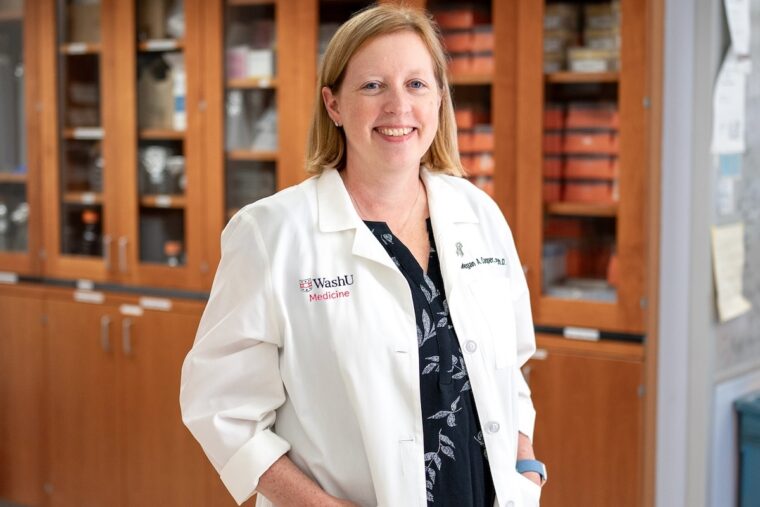
Immune disorders include rare genetic conditions that weaken the immune system, leaving patients vulnerable to dangerous infections and other problems such as autoimmunity, inflammation and cancer. Despite being a powerful diagnostic tool, genetic testing - which identifies changes, or mutations, in an individual's genetic material - has uncovered about 550 such conditions but still leaves 70% of people with suspected immune deficiencies undiagnosed.
Megan A. Cooper, MD, PhD, the Anthony R. French, MD, PhD, Professor of Pediatrics at Washington University School of Medicine in St. Louis, has received a five-year $12.4 million grant from the National Institute of Allergy and Infectious Diseases of the National Institutes of Health (NIH) to study genetic processes missed by standard genetic testing that may be involved in causing immune disorders in children and adults. This research may reveal new genetic causes of immune disorders and provide answers to patients awaiting a diagnosis.
"The diagnostic rate for rare immune disorders has remained stagnant over the last decade," said Cooper, an internationally recognized physician-scientist who specializes in diagnosing and treating rare genetic diseases affecting the immune system, especially in children. "Effective treatment depends on understanding the specific problems within a patient's immune system. A diagnosis enables access to targeted treatments, effective disease management and prevention strategies."
For patients with suspected immune deficiency, symptoms can be ambiguous and include prolonged fevers after common infections, such as respiratory infections; frequent unusual infections; autoimmune disease; susceptibility to cancers; and severe allergies, among others. No two patients experience the same symptoms, explained Cooper, which makes diagnosing immune disorders challenging.
"I see a lot of patients who are sick all the time," said Cooper, who collaborates with specialists worldwide to solve puzzling diagnostic cases affecting children. "When we don't know what is causing their symptoms, we are left with giving them very broad, non-specific therapies that can sometimes be ineffective. This work hopes to provide more families with life-saving molecular diagnoses that can guide treatment."
Uncovering novel genetic causes
Genetic testing finds changes in an individual's DNA and is effective at detecting errors that are present from the start of development and affect all the cells in the body. Mutations that cells acquire over time, which are rare in the body or affect only specific tissue types, are much harder to detect with standard genetic sequencing.
To help solve this problem, Cooper and two collaborators at Columbia University Vagelos College of Physicians and Surgeons in New York City - Dusan Bogunovic, PhD, an immunologist and professor of pediatrics and a co-principal investigator on the grant, and Joshua Milner, MD, an immunologist and professor of pediatrics - will use a technique called deep sequencing, which allows them to examine genes in patients with a level of detail and accuracy that standard sequencing cannot achieve, helping to identify changes that affect even a small number of cells.
They also will study, under Bogunovic's leadership, a unique genetic process that can cause some, but not all, family members to be affected by illness, despite all members inheriting one faulty and one healthy copy of a gene. Whether a family member remains healthy or develops disease depends on which gene copy remains active. The study aims to find genes in the immune system that follow such a pattern and better understand the factors that control it.
The roughly 550 known immune disorders caused by different genetic changes result in symptoms that are highly variable and unique to individuals. Another focus area, led by Milner, seeks to explore how combinations of common genetic changes - rather than single gene mutations - impact an individual's risk for illness and severity. They will study the effects of these common changes in patient cells, while correlating patient symptoms with the genetic change combination they carry.
The new grant was based on preliminary data that applied deep sequencing to looking for genetic differences in immune disorders. That work was supported by the NIH, St. Louis Children's Hospital Foundation and the Children's Discovery Institute, a collaboration between St. Louis Children's Hospital, its foundation and WashU Medicine to find innovative, more precise and personalized treatments for a spectrum of childhood diseases.
Other WashU Medicine investigators involved include Obi L. Griffith, PhD, a professor, and Malachi Griffith, PhD, an associate professor, both in the John T. Milliken Department of Medicine.
About Washington University School of Medicine
WashU Medicine is a global leader in academic medicine, including biomedical research, patient care and educational programs with 2,900 faculty. Its National Institutes of Health (NIH) research funding portfolio is the second largest among U.S. medical schools and has grown 83% since 2016. Together with institutional investment, WashU Medicine commits well over $1 billion annually to basic and clinical research innovation and training. Its faculty practice is consistently within the top five in the country, with more than 1,900 faculty physicians practicing at 130 locations. WashU Medicine physicians exclusively staff Barnes-Jewish and St. Louis Children's hospitals - the academic hospitals of BJC HealthCare - and treat patients at BJC's community hospitals in our region. WashU Medicine has a storied history in MD/PhD training, recently dedicated $100 million to scholarships and curriculum renewal for its medical students, and is home to top-notch training programs in every medical subspecialty as well as physical therapy, occupational therapy, and audiology and communications sciences.
Originally published on the WashU Medicine website






